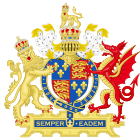Act of Toleration 1689

|
|
| Long title | An Act for Exempting their Majestyes Protestant Subjects dissenting from the Church of England from the Penalties of certaine Lawes. |
|---|---|
| Citation | 1 Will & Mary c 18 |
| Dates | |
| Royal assent | 24 May 1689 |
|
Status: Repealed
|
|
| Text of statute as originally enacted | |
The Toleration Act 1689 (1 Will & Mary c 18), also referred to as the Act of Toleration, was an Act of the Parliament of England, which received the royal assent on 24 May 1689.
The Act allowed freedom of worship to nonconformists who had pledged to the oaths of Allegiance and Supremacy and rejected transubstantiation, i.e., Protestants who dissented from the Church of England such as Baptists and Congregationalists but not to Catholics. Nonconformists were allowed their own places of worship and their own teachers, as long as they accepted certain oaths of allegiance.
It purposely did not apply to Catholics, nontrinitarians and atheists. The Act continued the existing social and political disabilities for Dissenters, including their exclusion from political office and also from universities.
Dissenters were required to register their meeting locations and were forbidden from meeting in private homes. Any preachers who dissented had to be licensed.
Between 1772 and 1774, Reverend Doctor Edward Pickard gathered together dissenting ministers in order that the terms of the Toleration Act for dissenting clergy could be modified. Under his leadership, Parliament twice considered bills to modify the law. Both were unsuccessful and it was not until Pickard and many had lost interest that a new attempt was made in 1779.
The Act was amended (1779) by substituting belief in Scripture for belief in the Anglican (doctrinal) articles, but penalties on property remained.
Penalties against Unitarians were finally removed in the Doctrine of the Trinity Act 1813.
...
Wikipedia
